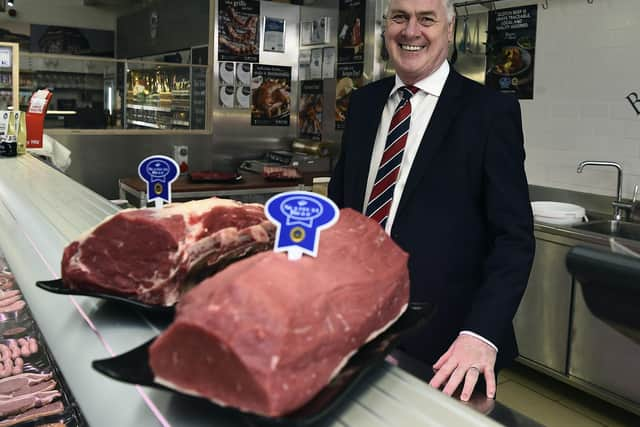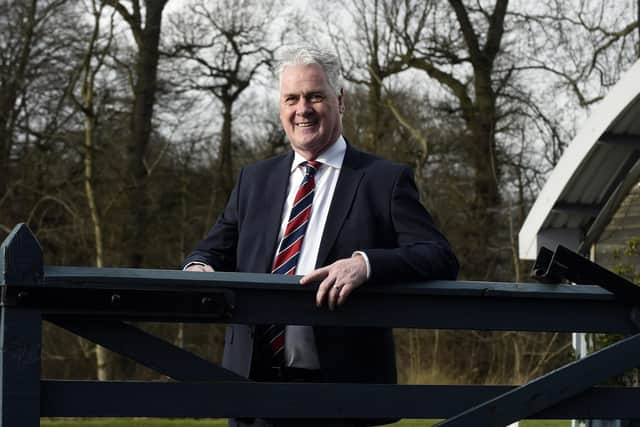The Big Interview: Quality Meat Scotland CEO Alan Clarke


QMS describes itself as working to shape a “sustainable and prospering” Scottish red meat industry, helping the sector to improve its efficiency and profitability, and maximise its contribution to Scotland’s economy.
Clarke is speaking in advance of the public body’s Meat the Future conference, taking place in Glasgow this Tuesday and aimed at the Scottish red meat industry supply chain.
Advertisement
Hide AdAdvertisement
Hide Ad“We have 400 delegates already signed up to attend,” he says, welcoming the fact that there are speakers coming from around the globe, from New Zealand, Uruguay, Australia, Belgium, not to mention Peebles.


Others include Scottish rural economy secretary Fergus Ewing, and livestock sustainability consultant Jude Capper, who will be highlighting how the Scottish beef and sheep production system can be sustainable.
Clarke also highlights that on the agenda is Marks & Spencer’s head of agriculture Steve McLean, who is trying to focus on efficiency and integrated supply chain partnerships and what the retailer is doing in that regard. A further name on the bill is Frédéric Leroy, a professor at Vrije Universiteit, Brussels, who is trying to combat some misconceptions around red meat and stress that “it is needed for good health as part of a balanced diet”, Clarke notes.
Also addressing delegates, inevitably, is the QMS boss himself, who says the event aims to provide some leadership for the industry, address certain challenges, and to highlight “some of the fantastic good practice that happens across our sector – one of the keys for us is the enhanced communication throughout the supply chain”.


Awareness
Clarke is keen to foster awareness of the sector’s high quality and ethical standards, against a backdrop of plant-based diets taking up an increasing amount of both headlines and supermarket shelf space.
“Anybody who wants to take on a plant-based diet, that is their decision,” says Clarke. “And the amount of people who do that is quite small as an overall percentage of the population.” More than 90 per cent of people in Scotland eat meat, he says.
The Vegan Society notes that the number of vegans in Britain quadrupled between 2014 and 2019 to reach 600,000 – a little over 1 per cent of the population. It also says the number of participants in Veganuary (where people eat the diet in January) reached a record of more than 400,000, up from just over 3,000 in 2014.
In Clarke’s view, the vegan faction can be “quite noisy” in January, with some publicised stories on meat production around the world highlighting practices that do not take place in Scotland.
Advertisement
Hide AdAdvertisement
Hide AdThat can be “a little bit frustrating”, he says. “And we have a really, really good story to tell. If you look around Scotland, 80 per cent of the land isn’t suitable for growing crops, but it is suitable for producing high-quality beef and lamb. And we have very strong sustainability credentials. The Scots were pioneers of whole of life, whole of supply chain quality assurance, and we have so many different credentials here, so it means that if anybody is ever thinking of reducing meat, you need to buy quality assured.”
To earn the Scottish red meat industry’s three premium brands – Scotch Beef PGI (Protected Geographical Indication), Scotch Lamb PGI and Specially Selected Pork – livestock must have been born, reared and slaughtered north of the Border and spent their entire life on QMS-assured holdings.
Quality
QMS last year launched its Meat With Integrity campaign that spans the three brands, and Clarke says the organisation’s view is that when you’re eating meat, get “the best you can afford – make sure it’s quality assured”.
It has also teamed up with the Scottish Society for Prevention of Cruelty to Animals (SSPCA) in what Clarke deems a “unique” collaboration. “I can’t see this anywhere else in the world… it’s a non-commercial partnership so no money changes hands,” he says, explaining that the charity joins QMS on certain farm visits, for example.
The red meat industry is also feeding into Ambition 2030, which aims to see Scotland’s turnover in farming, fishing and food and drink reach £30 billion by that date.
It’s an initiative Clarke knows very well indeed. He has been on the partnership board of Scotland Food & Drink since he came to Scotland about a decade ago. “And I was one of the architects of Ambition 2030.”
The Scottish red meat trade currently supports 50,000 jobs and contributes £2bn to the economy. “What we’re trying to do is to maintain that within the UK market and to grow that in our exports.
“We’ve managed to get Scotch beef back into Japan for the first time in 23 years recently,” he also states, shining a spotlight on the likes of Canada and China as target markets.
Advertisement
Hide AdAdvertisement
Hide AdQMS has helped to fund “in-market” experts – food and drink specialists employed by Scottish Development International. “That gives us access to salespeople on the ground,” Clarke states.
High-end Scottish produce is not a difficult sell. “We were in Japan recently at a trade fair and we met with a number of Japanese buyers. The quality spoke for itself. They were coming to us because of its reputation.”
Survey results published last week found that Scotland is seen as friendly and trustworthy in business, but many respondents called for the creation of a more enabling export environment for Scotland as a trading nation.
Brexit
Additionally, Scotland Food & Drink boss James Withers last month expressed concern that Scottish foods sold in Europe could be hit by a price hike of more than 50 per cent following Brexit.
Clarke said Europe is an important market for the sector he oversees. “We still have a number of unknowns, and what will our future trade relationship look like with Europe?… at least now we’re starting to work our way through it. We know it’s going to be difficult, but with the timeline that has been set by the UK government, we’re hoping that some of that uncertainty will be removed over the next few months.”
The QMS boss says his current role is his first as chief executive of a non-departmental public body – and his debut working in red meat and farming.
“I’m trying to understand the [industry] and what I’m trying to use is the business experience I’ve had outside of red meat to make a difference,” he adds, with his stint at Scottish Bakers seeing him join what he describes as a fairly traditional organisation. He aimed to “put a bit of oxygen into it and make it modern and fit for purpose”, and under his tenure it “significantly” increased membership and engagement with its members.
It was another milestone on the varied career path of Clarke, a fellow of the Chartered Management Institute and member of the Chartered Institute of Personnel and Development.
Advertisement
Hide AdAdvertisement
Hide AdHe left school at 16 and went to work in an electrical and mechanical contractors. This was followed by a move into retail, including managerial posts in the shoe industry with the likes of Russell & Bromley, and then a move back to his native Northern Ireland to became general manager of LeisureWorld, a large sports and toy shop in Belfast.
Training
He then became general manager of a shoe retailer that had various stores across Northern Ireland. “I was responsible for running those and all the HR side and training side – and I suppose that’s really where I got my training bug.”
Clarke ended up going back to university part time, picking up qualifications including an MBA, and he then spent about a decade as chief executive of the Wholesale & Retail Training Council in Northern Ireland, followed by being named regional director of Lifelong Learning UK.
His current role involves QMS dealing with stakeholder (or should that be steakholder?) organisations as it aims to encourage “ordinary customers to recognise the value and the quality of the products we have – and to continually come back and purchase them”.
He adds: “We’ve put together our new strategy. We’ve tried to keep it very simple. We’re trying to support the Scottish red meat industry, develop the Scottish red meat industry, promote it and protect it. And those are the four key things in all of our activities.”
“The natural ingredients we have here [in Scotland] are superb. I had a dinner party recently and I love cooking, so I’d cooked a full fillet of beef and sliced it at the table. One of the guys sitting there said to me, ‘You must have the best job in the world’ – and I said, ‘I do’.
“It’s been a fantastic journey, because it is an industry like no other.”
